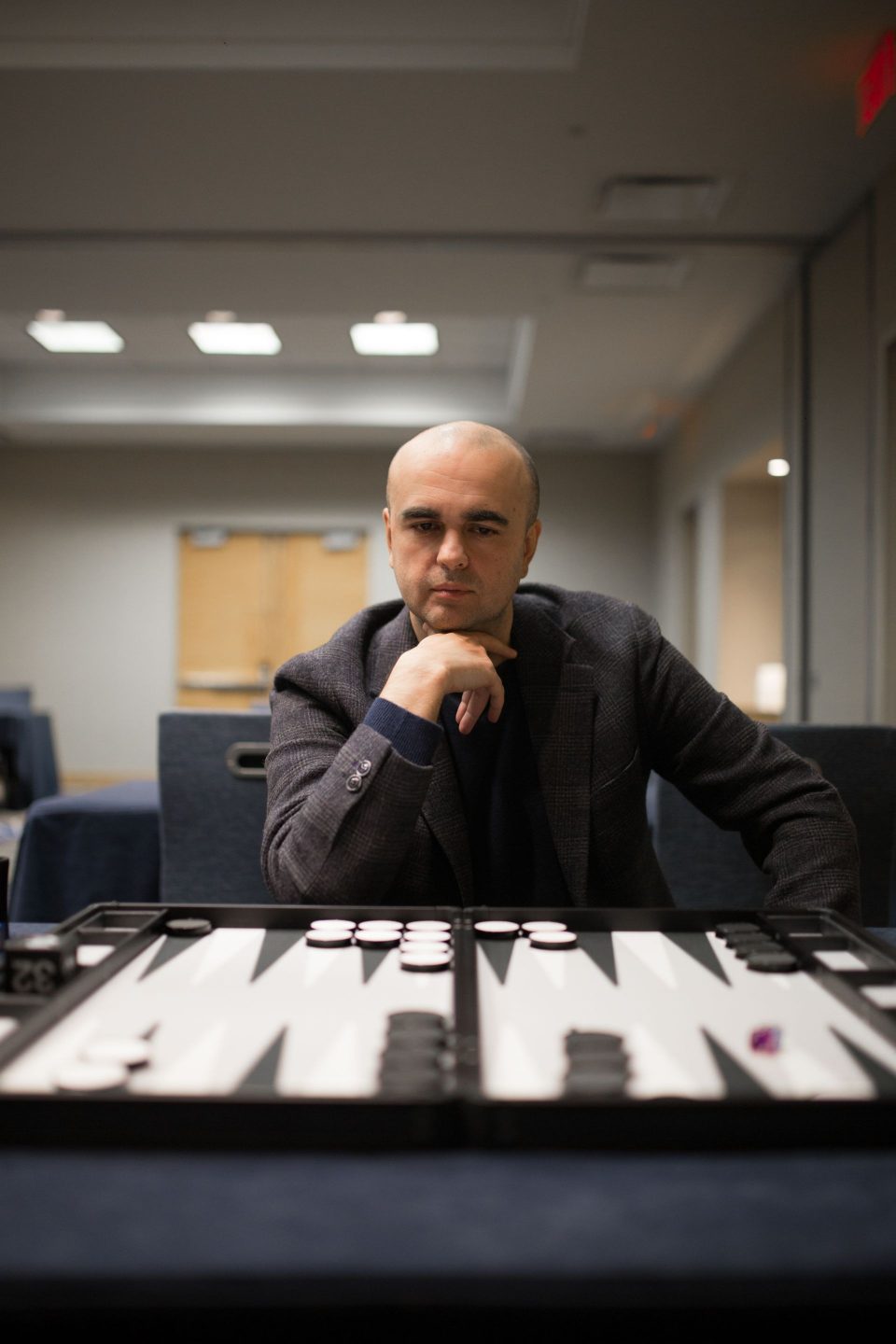
Every single day, I find out about people who live in Jersey City who have exceptional talents. It’s almost mind-boggling. Alia Azamat emailed me a few months ago telling me about her partner, Victor Ashkenazi, who works in trading at Golden Sachs by day and grandmaster of backgammon by night. Backgammon is a board game based on calculations and skill. It’s easy-to-learn and is a great way to keep your mind active.
I have a personal appreciation for backgammon because, growing up, my grandfather in Israel would play it on the beach. In Israel, they call it Shesh Besh. He always wanted me to play with him, but I never had the patience to pick it up. Any time i see anyone playing backgammon, it brings me back to those mornings onthe beach with my Saba.
Anyway, back to Victor. Alia invited us to a tournament that was happening at the Hyatt in Jersey City. Apparently, this event happens yearly and I had no idea it was happening in our own backyard. I got a chance to watch the players from different walks of life compete against each other. I interviewed Alia, and got to learn more about Victor and the game of backgammon.
This is our second episode of It Was All A Dream, featuring Victor Ashkenazi, a person who found a passion and not only pursued it, but also became a world champion.
You can watch the clip or read the full interview!
So, Alia, tell me more about backgammon.
Alia: For centuries, backgammon was a game for the rich. In US it was also known as a game of wealthy people who play for big stakes. They would be playing at fancy parties, where they had to wear tuxes just to be “allowed” to sit at the board. It was honorable, it was chic. The Bloomberg actually talked about it in their article about Victor Ashkenazi, “America’s Best Backgammon Player Works at Goldman Sachs”. They wrote that investment bankers, traders, and rich people are still fond of the game and backgammon nowadays is in times of resurgence. Many years ago here, it was a game almost exclusively for the successful people, like Hollywood stars, and it was never a pro-tournament type of game. Right now, what’s happening is that professional players come to arena. Most of them live on backgammon: they go to tournaments, try to win them, get money for it, get trophies, and then go to another tourney and try to win there. It’s become more like chess or poker. A small percentage of players still work at their regular jobs, and the most backgammon people are very interesting characters from all walks of life.
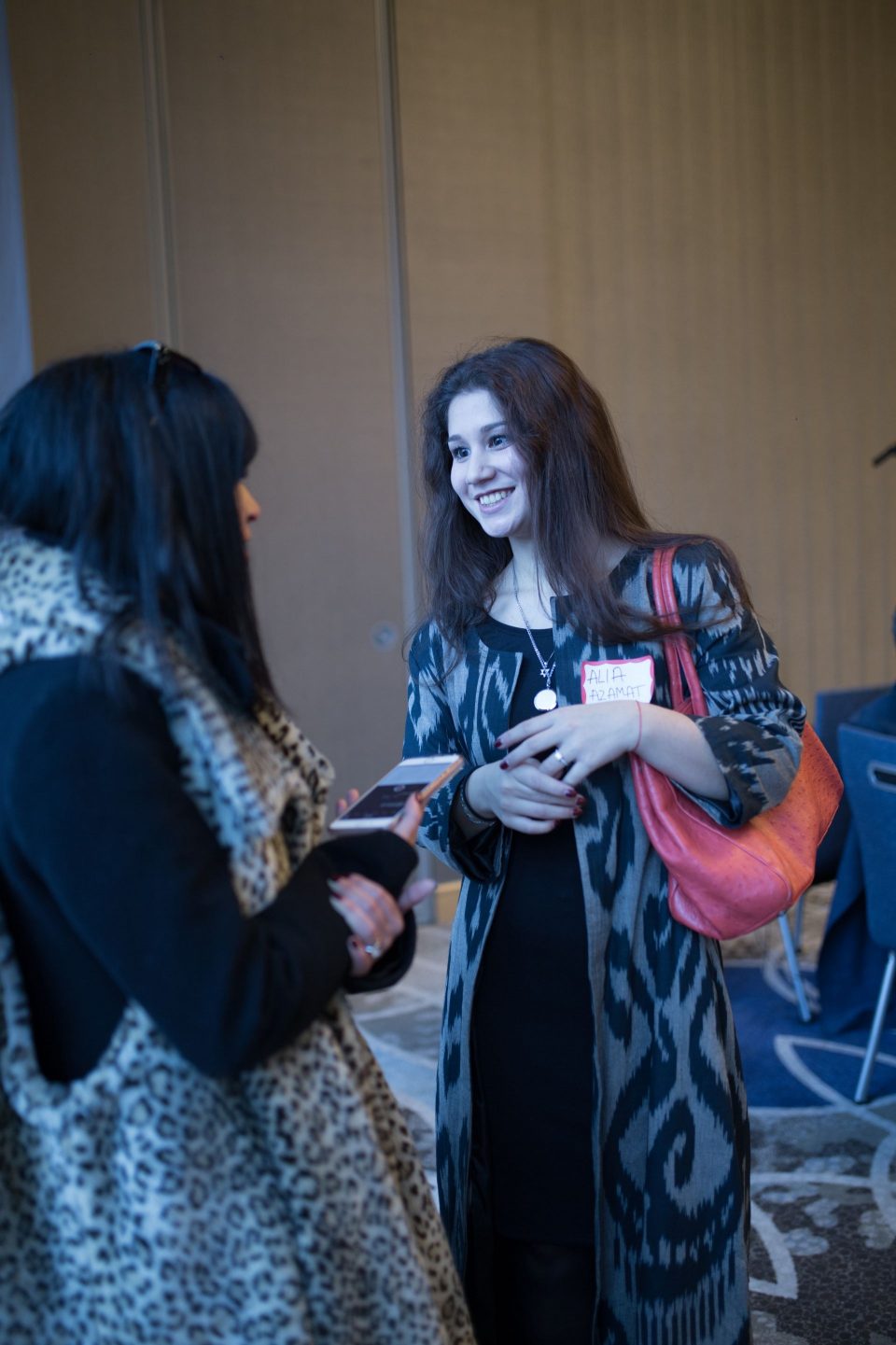
Just from being here and walking through the room and talking to all these characters, you can tell everyone has a unique story. It’s amazing. So why is it a game for the rich?
Alia: Because even though you compete individually, you still have fun playing, and you don’t spend a ton of time on the game itself — comparing to chess, for example. You don’t have to be constantly learning new things for the rest of your life in order to be a good player. You might, but you don’t have to. You can win lots of money, or loose lots of money. It’s highly competitive and enormously volatile. What can I say, side bets are happening all the time! It’s just fun to watch and fun to play backgammon.
You play too, right?
Alia: I do play. I’m in the tournament!
Is that how you and Victor met?
Alia: No, we met online, but that’s how I started playing myself — because of Victor. He didn’t want me to learn the game back then, he thought that one backgammon player in the family was enough, but I tried playing against the computer anyway. Then I started watching Victor, which is the best learning experience in backgammon, I believe. I watched him play live and online for hours and tried to pick up his technique and “philosophy of the game”, if you wish. He has an amazing, pronounced style of play, it’s positional, it’s very balanced, the harmony in his each and every move is explicit, it’s like watching a pianist play. The hands, the pacing, the thought process — beautiful. That’s how I grew over these years and was able to win a couple of tournaments on my own.
This is awesome. I noticed there aren’t that many women here. There are a few, but not that many.
Alia: What’s interesting is that the last year, 2015 — was an incredible year for ladies in backgammon. A young woman, —fairly new to backgammon scene,— named Akiko Yazawa became a World Champion. Akiko is from Japan, she has an amazing personality and life story, she is a real fighter and true Champion. She’s one of the most, if not the most, famous women in backgammon history. Her win in Monte Carlo and her success in backgammon overall is a huge step for bringing more female players in backgammon, but it is still a work in progress.
So when I talk to Victor, can I play against him?
Alia: Yes, of course!
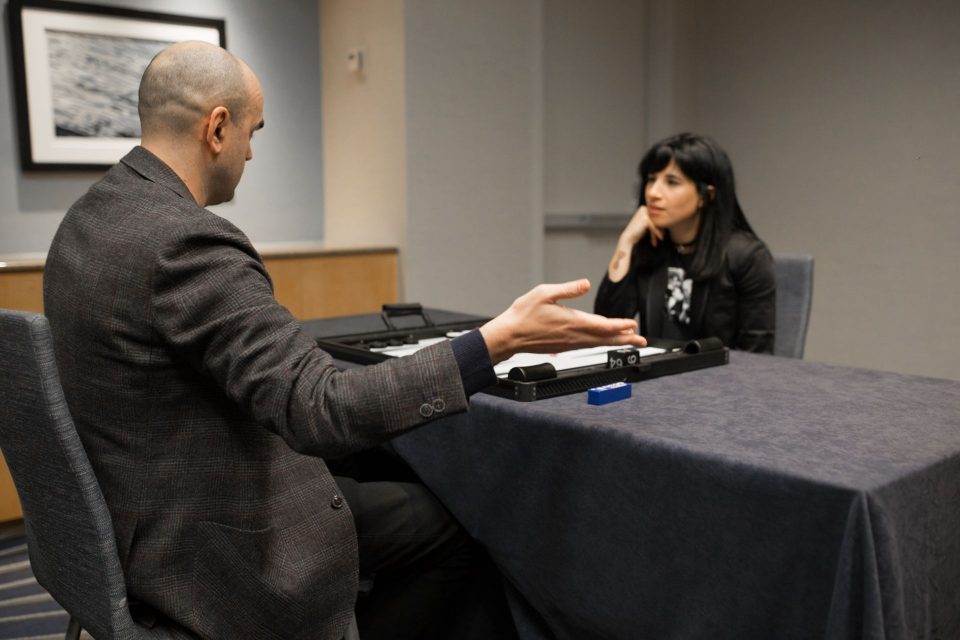
So Victor just asked me if I’ve played before. So – I’m Israeli and they play Shesh Besh in Israel.
Oh then, you must be good.
I’m terrible. So, my grandfather – I would go to the beach with my grandfather once every two weeks on, like, a Saturday and he would play Shesh Besh and he would sit me down. Like, “you need to learn, you need to exercise your – you know, he has a Russian accent. I’m half Russian.
You are?
Yeah. My mother’s Russian, so my grandfather would try to teach me Shesh Besh and say, “You have to exercise your brain, you have to start young, it’s a great game. You need to do it.” And I was like, “No, I just want to tan and play in the sand,” so I never really picked it up. I mean, I sort of know… can you walk me through it?
Of course, you want to play more than talk, or…?
So I want to talk – can we talk and play at the same time?
Yeah. Some people like to talk, some people stay quiet.
Do they swear?
It used to be more of that.
Like, “let me see your next move!”
Right. I mean, if you stay in the room for a little bit, especially later at night when the tournament will stop and some money games will begin to pick up, you’ll hear much more of that.
What do people say?
I mean, they’re going to complain.
Do you talk? You don’t talk at all between each other? Are you ever like, “Oh, good play!”
Oh yeah, sometimes we do. But also, mostly I would say you’d hear more negative things. People complain about their numbers, saying they’re so unlucky.
Okay, I don’t know if I can do it. I won’t be able to focus. Can you just explain the premise of the game first?
So the purpose of the game is to move your checkers around the board and take them all off the board. So basically, the way I set it up, you play with the black pieces. You’re going to move clockwise.
So like this?
Yes. You’re going to move all your checkers – that’s your home (points on the board). You’re going to move all these checkers here (points on the board). When they’re all going to be here, all 15 checkers, you’re going to start to bear off, which means you’re going to take checkers off the board. The first person who takes off all the checkers wins the game.
Got it.
Let’s play.
I’m going to win, guys! No, probably not.
Okay, so what’s your name first?
Victor Ashkenazi.
And how long have you been playing backgammon?
It’s actually funny. I haven’t played – I’m from Russia. I’ve only been here for 16, 18 years. And I hadn’t played backgammon back home, I played chess. So the same way like your grandfather was telling you to play backgammon to develop your mind, my parents actually told me to play chess. So I played chess in my youth and I played in a couple of junior Russian championships, and then just quit because I had to go to university. So I actually saw the game here for the first time. I was 22. I was walking by Times Square, Bryant Park. That’s actually the first time I saw people playing backgammon.
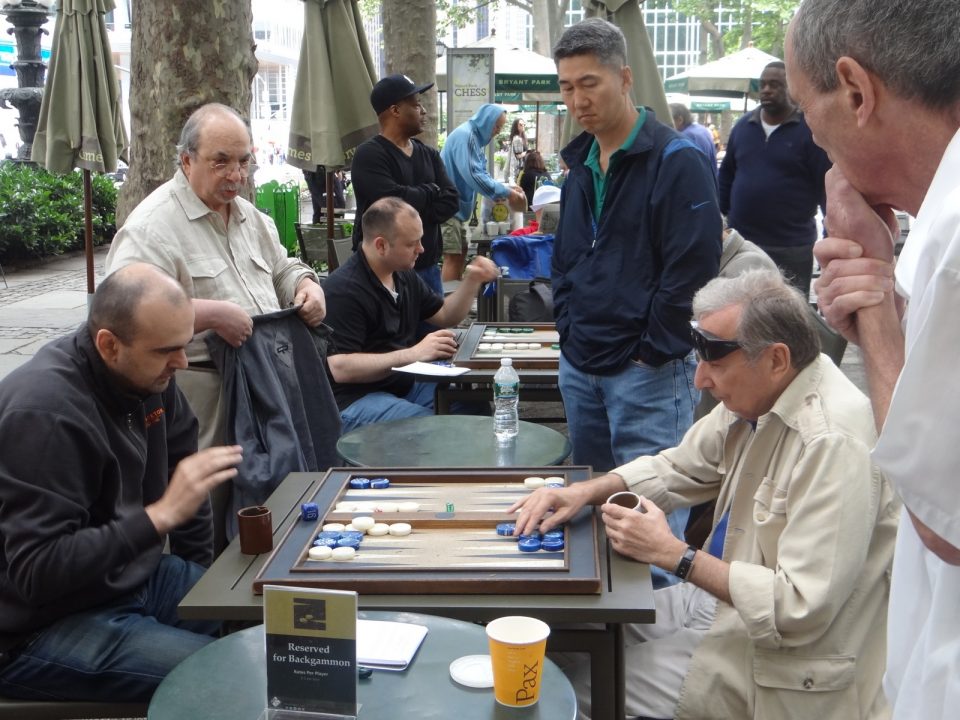
Oh, wow.
In the same park, people also played chess, so I just came by and just naturally watched. So I played chess a little bit and somebody was playing backgammon next to me, so I watched them for a few days. I saw how they play, and then just tried to play myself. I just found the game fascinating. It’s a very interesting mix of skill and luck. So it’s not like chess.
Right. Chess, you have to really focus.
Not just that. In chess, you find if you’re better than me, even a little bit, you’re probably going to win 90% of the games. In backgammon, that’s not the case.
Really?
So even if you’re better than somebody, but not by much, you’re probably 55% favored. Basically, it’s much more luck involved here.
Right. Is it luck of what you draw?
The luck is what you roll in the dice. Of course, if it’s a big difference between the players in their skill, then the luck doesn’t play that much of a role. But if it’s equal players, then the luck plays a much bigger role.
And how many hours a week do you play?
It’s a tough, tough question. I mean, I try to train because I play competitively. I try to play every day at least one match online.
Oh, wow. Online, okay, so there’s online matches.
Yeah, it just takes less time in general. And I don’t know, I probably played tournaments for 10 years.
That’s amazing. How long do matches usually last for?
It can last for, like, 50 minutes. It can last an hour and a half. It depends on how it’s going. Now you see we started playing with the clock.
It makes your heart rate go up.
It also makes people play a little faster.
It’s like a good workout, but you’re not moving.
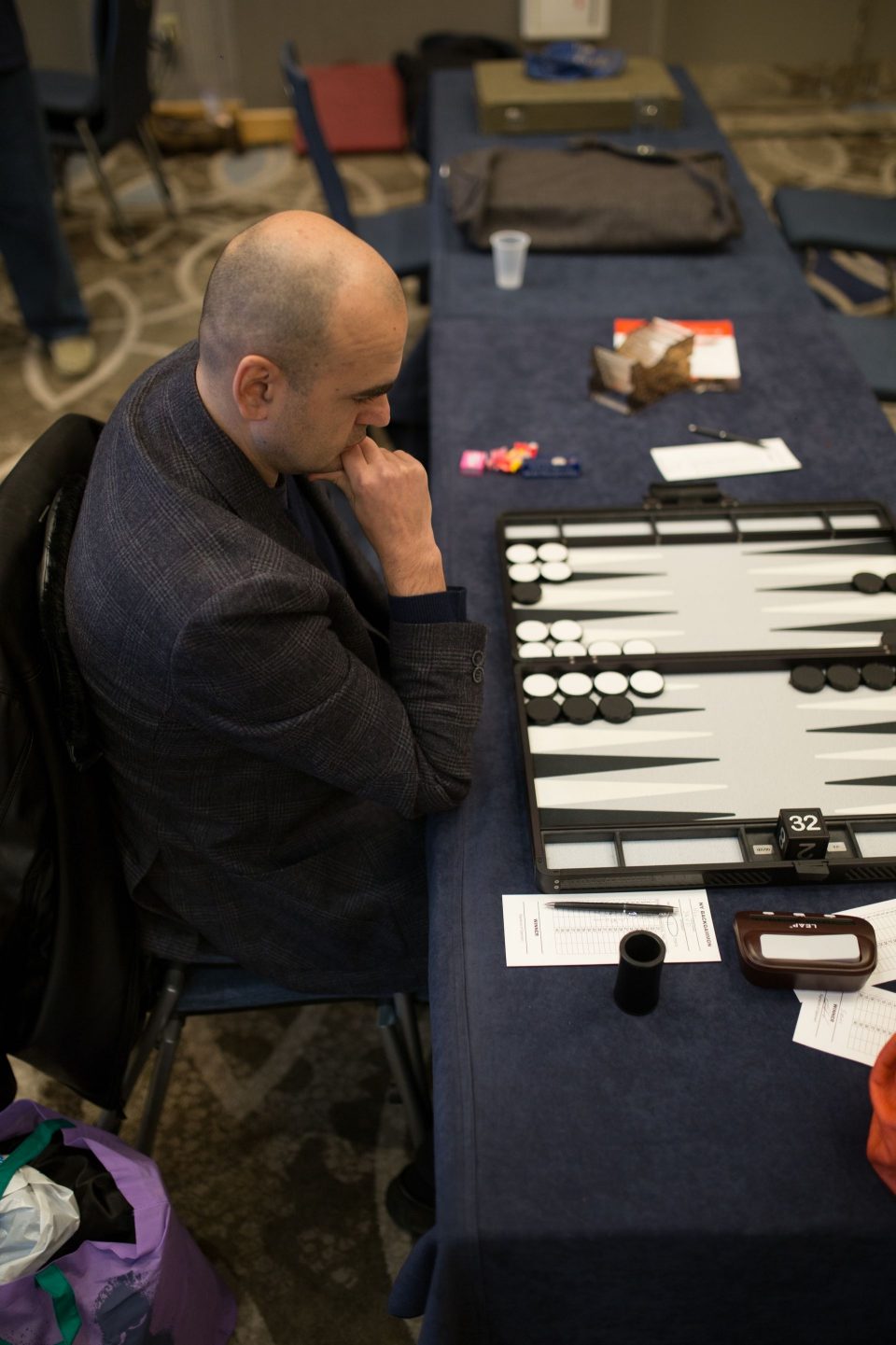
Okay, I want to try one. So what do I do?
I mean, first of all –
You have this thing.
Yeah, you can use the cup. So, first rule, actually – we roll one die each. Not two dice, but one die. Take one die off, and just roll it.
Ha, shows how much I know. Okay, go like this…
Yes, and that’s your side.
Okay, so I’m 4.
And I’m 5. Me, I got the bigger number, which means I play the number: 5, 4. 5 and 4. Then next roll, you roll both of your dice and that’s going to be your first normal roll. You’re going to play the full number.
Oh, sorry! I was supposed to go here, no?
It doesn’t matter.
So I’m at 6.
Actually, no, you’re at 5 and 1. The total is 6, but you have to play two separate numbers.
And now I move the black.
Yeah, you play with the black. So basically, if you want to play 5, you can go 1 2 3 4 5. Each of these signs represent one number, so it’s 1 2 3 4 5. (points on the board)
Now do you have to be good at math to be good at this game?
I mean, preferably. It helps. In certain situations.
I failed math.
*laughs*
That’s why I’m a blogger.
But it’s not very much involved. It is, math is involved. Don’t get me wrong, but it’s not like chess. You don’t have to probe and compute as many things, or calculate as many things as you are in chess. In chess, it’s not much calculation, but you actually try to predict what’s going to happen or calculate what’s going to happen in 3 4 5 moves. It takes a lot of time and calculation. You just sit and try to memorize all the possible positions that may happen. Here, you have this unknown factor, which is dice, which makes the game much more unpredictable. So it’s a more positional game. Your checkers have to be positioned. Your position has to be very flexible and if you play a few games, you start to get a feel of how your checkers have to be placed.
I’m getting flashbacks from my childhood right now.
I already remind you of your grandfather?
How did you go from playing backgammon to deciding to take it competitively?
Because I played chess, I guess, my learning curve was shorter than probably for a person who starts from the beginning. And in a few months already, I found myself beating most of the players in the park. And then in the little bit, I found that I –
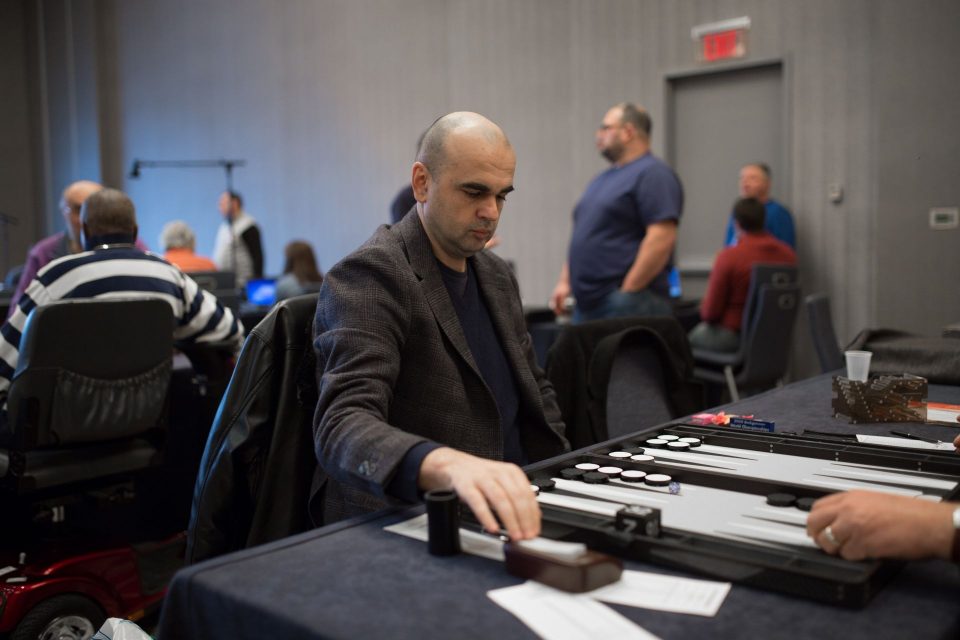
So you’d sit in Bryant Park and you’d just start playing strangers?
Yeah, actually, that was before I got my first job in the US. Then I just played a little more. In a while, everybody realized that actually I’m the best player there, you know, maybe because of chess. It helps you to pick up some skills. I decided just to go and see what’s backgammon actually, how it is organized, does it have any tournaments. Then I found out there is. They have it in the US, it’s called ABT, which stands for American Backgammon Tour. It’s like 16-20 tournaments a year in different cities. You know, you can join any time and you can play competitively. This is one of them. This (New York Metropolitan Open – Ed.) is the first tournament of the year, and they go everywhere. Like in Las Vegas, we have two tournaments and in LA, we have two tournaments. San Antonio, Dallas, and other places. So then I just went. I think it was 2007, the first time I played in Las Vegas and it was the biggest tournament in the US. There were probably a two hundred or 250 competitors. And I happened to win it.
How much money did you win?
It wasn’t much money. In backgammon in general, it’s more like a pride game.
How does it feel when you win?
It felt great. I mean, you feel like you didn’t waste your time when you spent all this time on the game. ‘cause I work too, right. I work in Goldman Sachs. So I don’t have much free time. I spend most of my free time on backgammon, so if I wouldn’t have good results, I don’t know if I would continue playing.
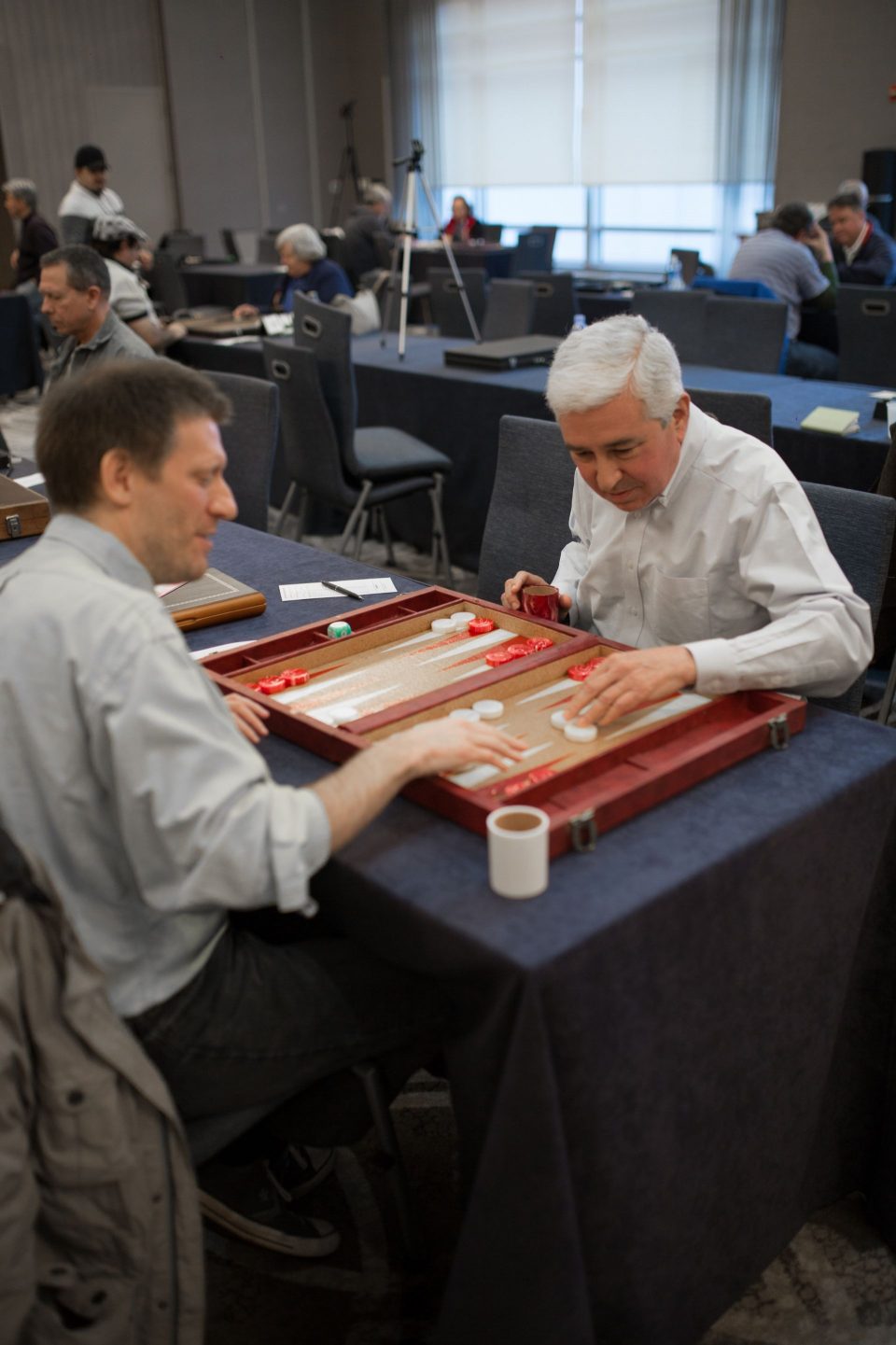
So how long have you been in Goldman Sachs?
10 years.
10 years? And what do you do there?
I started on their compliance operations side, but now I’m in trading.
And how does that translate in backgammon? Do you use your skills or vice-versa?
It’s actually very interesting, I just gave an interview to a big Chilean newspaper, La Segunda, about two weeks ago and they asked me exactly that question: if backgammon helps in trading. It probably does. I don’t know if there’s a direct correlation, but I know in the history of the New York financial world, there’s been a couple of experiments that have been done by companies where they tried to actually hire gamblers from the street along with very well-educated people like from Harvard or MIT and stuff. They tried to put them against each other in trading, and I think the first group actually did better. Susquehanna (brokerage firm – Ed.), I know they did years ago, and the reason is because backgammon is, like I said, a combination of the skill and luck. In trading, very similarly, you have to figure out where your equity’s good. Like, where it’s worth to take a risk. That’s pretty much all this game is about, ‘cause it’s also a cube here, which kind of multiplies the price of the game – when to give a cube, when to take a cube. You know, the risk and reward ratio is crucial in this.
Is there like an adrenaline rush when you’re playing?
Absolutely. At some point, yeah. When you play your final tournament, it is absolutely there. Even now, I just had a very close match before this interview. We basically played to 11 points. The score was 10-10. The last game decided –
Do or die.
Yeah. You know, as much as I played and as much as I won, I still felt some of the adrenaline.
Right. It’s interesting because I had no idea that something like this existed until your lovely life partner –
It’s a small niche, yeah. It’s a small niche.
Do you feel like it’s a dying art, in a way? Like it’s something that used to be more popular and now isn’t as well-known?
It’s a good question. I don’t know if you’ve seen the article in Bloomberg.
Yeah, I did.
You did! So they picked up on that a few weeks ago. Actually, there’s a little bit of resurgence. Backgammon has been very popular in the US in the 70s and 80s.
Right.
When I say “very popular,” it doesn’t mean that every kid on the street would play. It’s not like basketball, but it was very popular among rich and influential people. You know, in the Playboy mansion, it was a favorite game there. A lot of wealthy people in Manhattan played backgammon at the time. Amateur tournaments, you know – you asked about money, at the time there was a lot of money in backgammon. And it just was over-popular for, I don’t know, 10 years. Then it kind of died down and it was staying low for 20 years. And then the poker resurgence, you know, poker appeared on TV and that yielded much more money. Some part of the poker elite actually came from backgammon because it’s very similar. Again, a combination of the risk, of they way you think about the game is similar in backgammon as it is in poker. And that lasted about 5 to 7 years. There is a little bit of a resurgence, not at a big scale yet, but there are more players in tournaments.
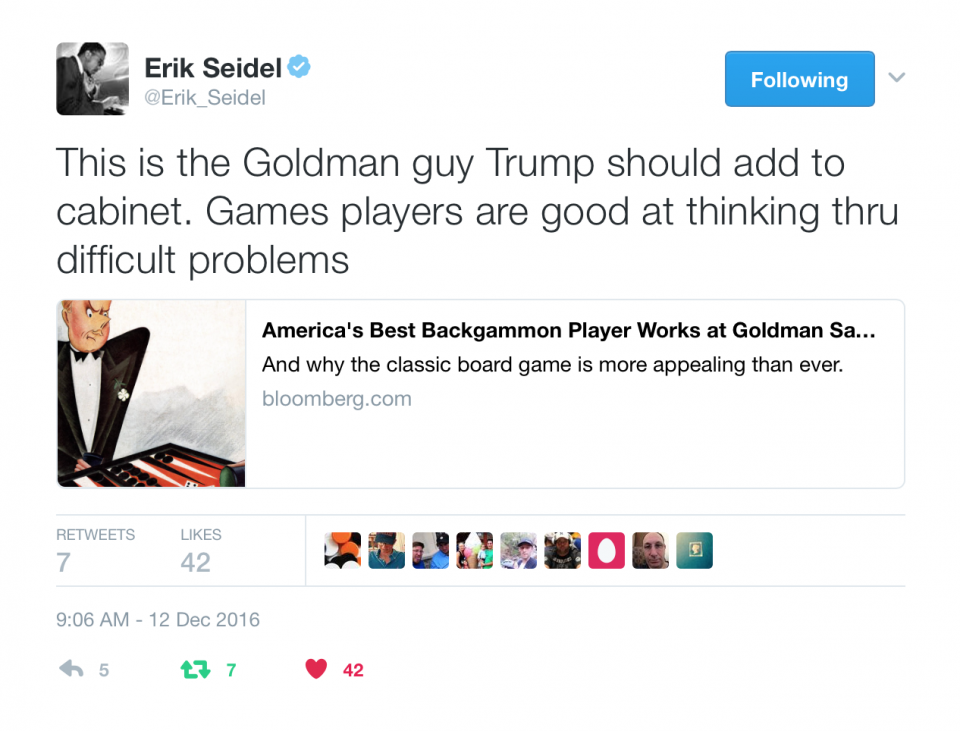
And why do you think that is?
Even I, —being inside,— I have no idea. You know, it’s actually even more popular now in Europe than it is here. More young players play. If you go to some place like Denmark, for example, they actually teach backgammon at school. It’s a very unusual move. Or, of course, it’s very popular in Eastern Europe, like Turkey.
So let’s say people are watching – how would you convince them to try a game of backgammon?
It first may appear boring.
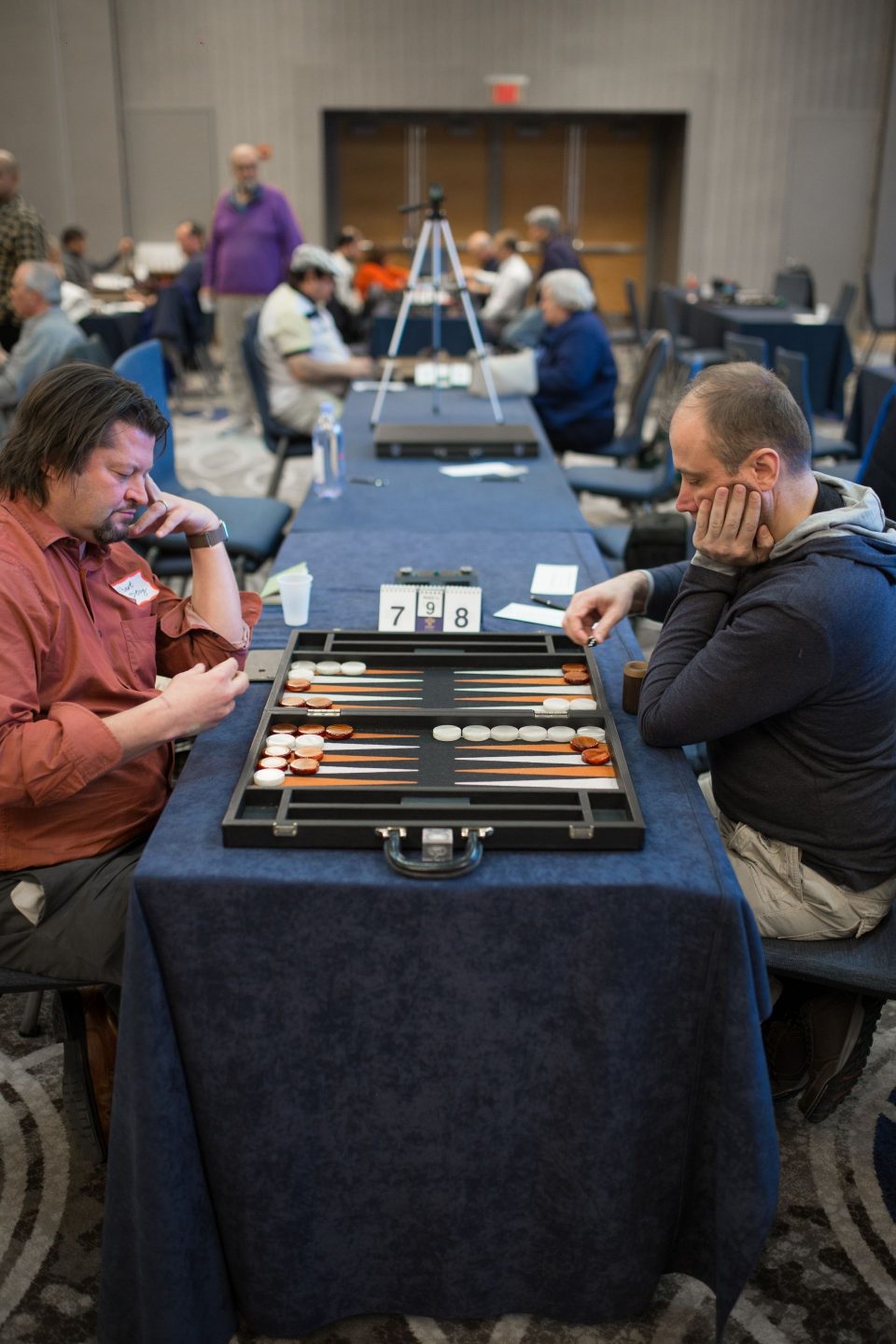
Put your phone away.
Right. When you’re just watching and you don’t know anything about the game, it may appear boring. But from inside, when you start playing, and I play probably most of the games that exist like cards, or like I said, chess, all kinds of games. This is just, in my opinion, the most exciting game. The reason is, when you’re playing, you go through the game and there’s so much up and downs, so many turns. At one moment, you’re a big favorite in the game, and then just because of one bad roll you become a big underdog, and then it changes again… It’s so much excitement in this game when you play it that when you’re inside this game, when you like it, you’re going to love it. If you’d spent a little more time with your grandfather, you know, playing backgammon…
Oh my god, don’t make me feel guilty because he’s not alive anymore.
Oh, first of all, it’s never too late.
Rest in peace, Saba.
So you live in Jersey City. And how long have you been in Jersey City?
5 years.
5 years?
Mhmm. We live near Grove Street.
And how did you end up here?
First of all, at the time, I was working at the Goldman building on 30 Hudson. Now I’m in Manhattan, but I used to be on the Jersey side. I lived right in Downtown Manhattan, and I was thinking about buying a place and just looked around, and found a place next to work.
Awesome. And do you have a favorite Jersey City hangout spot?
Yeah. First of all, we’re both huge fans of Jersey City, especially the Grove Street area. I think it developed very rapidly. I mean, you can see it with the new restaurants every day. We have a few restaurants that we go every day to. Madame Claude used to be the one we’d go to every Friday. They all know us by first name. Now, this Italian place next to us
Alia: Pasta Dal Cuore
Oh, I love that place. It’s right by our office actually.
And then the coffee place across the street, also on Jersey Avenue.
Choc-O-Pain?
Choc-o-Pain. It’s like my favorite.
That’s our whole area!
So if you go there, you’re going to see us there.
Oh, you’re there! You guys look familiar.
*laughs* We’ve seen you somewhere!
I feel like I’ve seen you, you know? Like just walking around. So anything else you want people to know about you or the game of backgammon? Or any future things happening for you?
I mean, me…like I said, backgammon is just like I said, fascinating. I guarantee you. If a person would spend like a month, just a little bit, and start playing, they would become a fan of the game.
And do you think it helps, like, with your mental development?
Yes! Yes, and first of all it makes your mind very sharp. And you are leaning on the edge. This is edge, again, between the risk and reward. So basically, you may think of this as a gamble, it’s not.
We’re not, like, jumping out of a plane.
Yes. Yes, exactly. It’s the same as trading. You try to find the situation where you would have the most equity or you would have it biggest, and then you take it easy. So this is very – it’s an old skill. When I go to a casino, I never gamble. I’m not a gambler at all. I would never, like, play–
Play cards.
No. I wouldn’t do it. I only play skill games because I feel like your skill determines the results.
Right. It’s very cool that you have sort of a double life, in a way.
It is.
That you work a normal Goldman Sachs job and then you come and you, like, kick butt in backgammon.
I’m the only one like that, by the way, because if you go to the plating room and you talk to other top players, they all would be backgammon professionals. Like, they wouldn’t have a regular job. And also, as we discussed before the interview, backgammon’s full of characters.
Do you think it’s, like, big in the Jewish community?
It is. It is, of course.
‘Cause in Israel, everyone plays it.
Yeah, it is huge.
Everyone plays it!
But not just Israel. You know, what it also gives me – I’m more known overseas than I am in the US because in the US, it’s not such a big game. When you go somewhere else-
You’re like famous.
Not just that, but also backgammon, it gives you friends around the world. There’s almost no place in the world –
It’s like a community.
– where I would go and I wouldn’t know someone.
So you’re like famous in the backgammon community. Like, people who follow backgammon, they know who you are?
Yeah, because we have a computer rating now. That’s what the guy in Bloomberg was trying to write about. And currently, we are number 1 and 2 with a Japanese guy, Mochy. Who is in the room there, too.
I saw that! He was losing, though, no?
He was? Like I said, it happens. That’s the beauty.
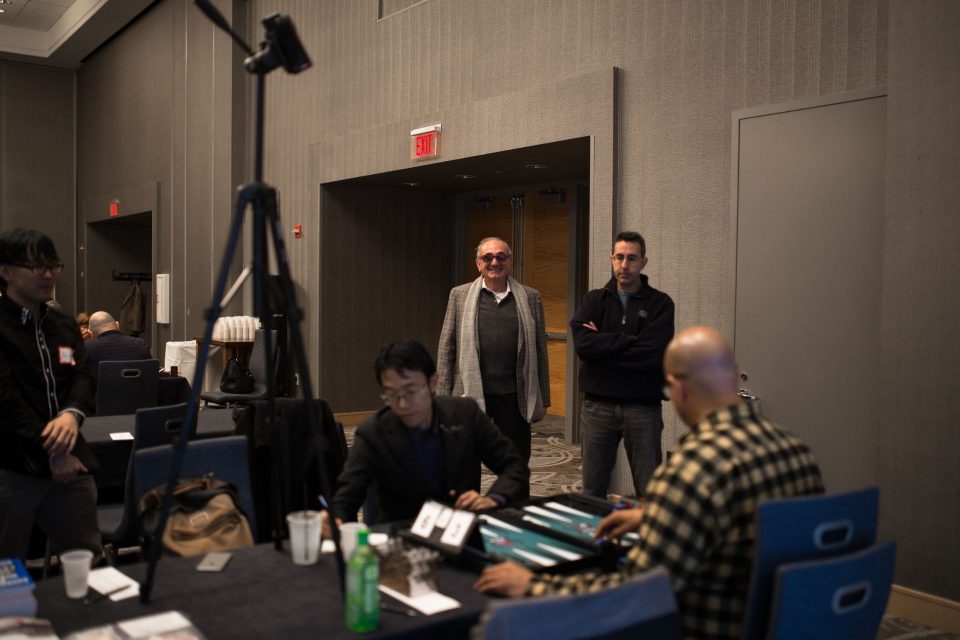
Sorry, Mochy. Shout out to Mochy, my boy!
And we have actually great girls playing backgammon. The best female backgammon player, she won a few years ago the World Championship, she’s from Japan, too. Akiko. Big friend of mine.
The Japanese, man, they’re good at everything. They come out of nowhere, too.
It’s a great culture. Such great culture, you know, they’re very smart.
They’re very smart, yeah.
Awesome, so let’s play, I guess, for a little bit? Oh god. Oy vey, as we would say.
Oy vey.
Follow Victor Ashkenazi on Facebook, Twitter, and Instagram.
You must be logged in to post a comment.